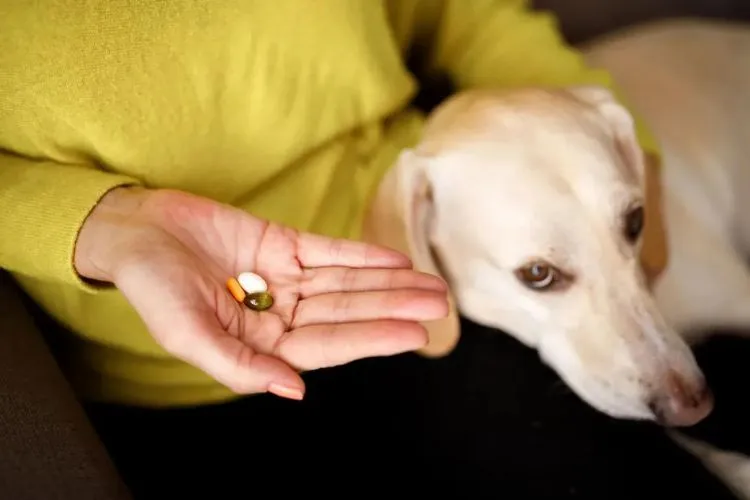When your dog suffers from diarrhea, it’s natural to seek quick and effective solutions.
Among various treatments, Imodium, a common remedy for diarrhea in humans, often comes up as a potential option.
But, can dogs have Imodium?
However, administering human medication to dogs carries its risks.
This article delves into whether Imodium is safe for dogs, covering dosage guidelines, safety concerns, and alternative treatments.

🐾 What Is Imodium?
Imodium, known by its generic name Loperamide, is a medication widely used to treat diarrhea in humans. It works by slowing down the movement of the gut. This helps reduce the frequency of bowel movements and makes the stools less watery.
🐾 Can Dogs Have Imodium?
Yes, under specific conditions, dogs can have Imodium. Veterinarians sometimes prescribe it for dogs with certain types of diarrhea.
However, it’s not suitable for all dogs or for treating all kinds of diarrhea. The root cause of the diarrhea and the dog’s overall health play crucial roles in this decision.
🐾 Safety Concerns and Side Effects
Imodium is generally safe for dogs when used correctly. Yet, it can cause side effects, especially if overdosed. Common side effects include sedation, bloating, and constipation.
Some dogs, particularly small breeds, older dogs, and those with pre-existing health conditions, may be more at risk.
Certain dog breeds carry a genetic mutation that makes them sensitive to drugs like Imodium. Breeds such as Collies, Australian Shepherds, and Whippets may experience severe side effects.
🐾 Dosage Guidelines for Dogs
Dosage is critical when it comes to Imodium. The general guideline is to give 0.1 mg per kilogram of the dog’s weight, every 8 hours. However, this can vary based on the dog’s health and the severity of diarrhea.
It’s paramount to consult a veterinarian before giving Imodium to your dog. They can provide precise dosage instructions suited to your dog’s specific needs.

🐾 Alternatives to Imodium
If Imodium is not recommended for your dog, several alternatives can help manage diarrhea. Dietary changes, like feeding bland foods (boiled chicken and rice) or adding pumpkin to their diet, can firm up stools.
Probiotics designed for dogs can also promote gut health. For more severe cases, veterinarians may prescribe specific dog-safe medications.
🐾 When to See a Vet
Diarrhea in dogs can stem from various causes, some of which require immediate veterinary attention.
If your dog’s diarrhea persists for more than a day, or if it’s accompanied by other symptoms like vomiting, lethargy, or loss of appetite, see a vet promptly. Treating diarrhea without understanding its cause can do more harm than good.
🐾 Understanding Different Types of Diarrhea in Dogs
Diarrhea in dogs can manifest in varied forms, each with distinct causes and implications for treatment. Broadly, these causes can be categorized into dietary indiscretions, infectious agents, and chronic diseases.
Dietary Indiscretions: A common cause of acute diarrhea, dietary indiscretions include ingestion of spoiled food, abrupt changes in diet, or eating non-food items.
These instances generally result in short-lived gastrointestinal upset, where Imodium might be suggested by a vet to manage symptoms.
Infections: Diarrhea can also stem from bacterial, viral, or parasitic infections. Examples include Parvovirus, Salmonella, and Giardia.
The treatment for infectious diarrhea often involves more than just symptomatic care with Imodium; it might require antibiotics, antiparasitics, or other specific therapies.
Chronic Diseases: Conditions like inflammatory bowel disease, certain cancers, or food intolerances can cause persistent or recurrent diarrhea.
In these cases, Imodium might not be advised or may only serve as part of a broader treatment approach that addresses the underlying condition.
Understanding the underlying cause of diarrhea is crucial before opting for treatments like Imodium. Misuse could mask symptoms of serious conditions or even worsen the situation.
Therefore, a veterinary consultation is imperative to diagnose the cause and decide the best course of action.
🐾 The Role of Diet in Managing Dog Diarracula
Diet plays a pivotal role in managing diarrhea in dogs, both as a standalone measure and in conjunction with medications like Imodium. When a dog develops diarrhea, one of the first recommended changes is to switch to a bland, easily digestible diet.

This typically consists of boiled chicken and white rice or specially formulated gastrointestinal diets available through veterinarians. These foods help to soothe the digestive tract and provide essential nutrients without adding strain.
Adding fiber-rich ingredients like canned pumpkin or psyllium husk can also bulk up the stool and normalize bowel movements. For chronic cases, veterinarians might suggest a long-term switch to hypoallergic or limited ingredient diets to prevent future episodes.
Always reintroduce regular dog food gradually to avoid triggering a recurrence and consult with a vet to tailor the diet according to your dog’s specific health needs.
Proper dietary management, along with appropriate medical intervention, can significantly ease symptoms and promote faster recovery.
🐾 Frequently Asked Questions (FAQs)
Over-the-counter Imodium can be safe for dogs in some cases, but it’s essential to consult a veterinarian before use. They can confirm whether it’s appropriate for your dog’s situation.
When used under veterinary guidance, Imodium can start to show effects within a few hours. However, if no improvement is seen within 48 hours, consult your vet.
If your dog shows any signs of an adverse reaction, such as increased sedation, bloating, or difficulty breathing, contact a veterinarian immediately.
Puppies have delicate systems and giving them Imodium without veterinary advice can be risky. If your puppy is experiencing diarrhea, it’s best to consult a vet for tailored advice and treatment.
Conclusion:
While Imodium can offer relief to dogs suffering from certain types of diarrhea, it’s not a one-size-fits-all solution. The key to safely treating your dog’s diarrhea is understanding the cause and consulting with a veterinarian for the best course of action.
Responsible pet ownership involves seeking professional advice rather than resorting to self-medication, ensuring the health and safety of your furry friend.
